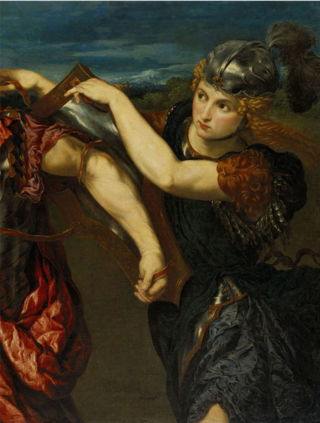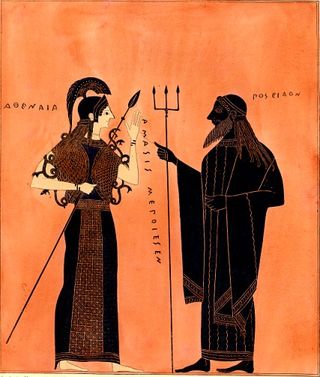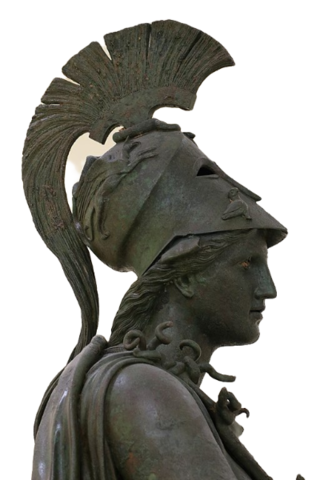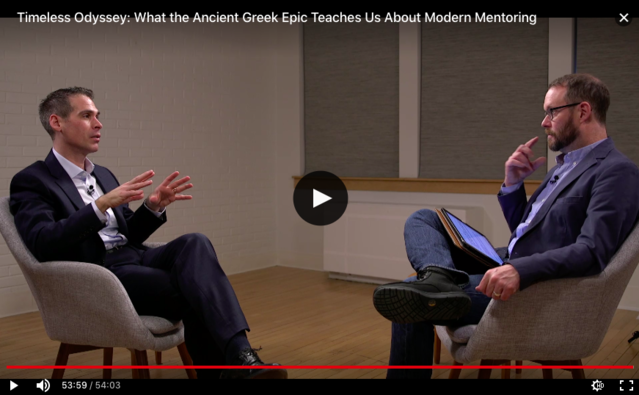Education
What Homer’s Odyssey Can Teach Us About Mentors and Sponsors
Classical lessons in business education.
Posted January 31, 2020 Reviewed by Hara Estroff Marano
This is part one of a two-part post on mentoring relationships. It is co-authored with Devin Bigoness, Executive Director for Customized Executive Education at the Cornell SC Johnson College of Business of Cornell University.
Classical literature can teach us many of the business lessons we need for life today.
The Odyssey is a perfect example. Homer's ancient epic can make you a better mentor, a better sponsor, and a more effective leader in today's network-driven world.
Surprised? Don't be. It's 2,700 years old, but Homer’s Odyssey is still routinely rated the greatest story of all time.

Or rather, two stories. One story the Odyssey tells is the adventures of a young man named Telemachus and an old man named Mentor. We’ll discuss Mentor’s mentorship in part two.
The other—the main story—is the epic struggle of a man, named Odysseus, to get back home after the Trojan War. In the twenty years it takes, he’s helped by Athena, goddess of wisdom and war. Athena supports and advocates for him right up to the end, when Odysseus returns, defeats his rivals, and reunites with his beloved wife, Penelope.
Athena’s actions, we suggest, are a case study in networking and effective sponsorship. Even better, they offer a clear demonstration of the difference between a mentor and a sponsor.
What's that all about? In a 2018 interview, Brenda Darden Wilkerson, CEO and President of AnitaB.org, made a great point:
A mentor is someone who can give advice and guidance whereas a sponsor can actively help the woman achieve her goal by being an advocate and placing her resume on the right desks.
Wilkerson expands on that distinction:
While a mentor might have casual check-ins, a sponsor will take charge of the professional experiences of the women they are sponsoring and advocate for any and all opportunities.
That’s the role Athena plays for Odysseus—and boy, does she!
As the Odyssey begins, Odysseus has been away from home for 17 years. He’s spent the last seven of them trapped on the remote island of Ogygia.
The goddess of wisdom thinks that's unfair. She wants to help Odysseus because she sees a bit of herself in him—he’s cunning and clever, like her.
Odysseus can never get ahead, though, because Poseidon, the god of the sea, is doing all he can to thwart him.

So, as the story starts, Athena waits till Poseidon is out of town. She calls a candid, confidential meeting with Zeus--the "CEO" of Olympus—to discuss her protégé's plight. She looks at Zeus steadily and says:
I am agonizing about Odysseus and his bad luck. For too long he has suffered, with no friends, sea all around him, sea on every side. He longs to see even just the smoke that rises from his own homeland, and he wants to die.
Athena speaks frankly, she sets a clear goal, and she makes it clear that Zeus’ indifference is causing real problems.
Even more, she makes those problems personal—both for herself and for Zeus:
You do not even care, Olympian! Remember how he sacrificed to you on the broad plain of Troy beside his ships? So why do you dismiss Odysseus?”
Now that’s how a sponsor talks! Athena’s strategy echoes the advice Wilkerson offers:
Sponsors are fierce advocates of the women they support and lead, not just mentors or allies.
We agree. In many ways, it is much easier to be a mentor than a sponsor. Mentors might say, “I wish I knew that when I was at your stage,” while sponsors put their own capital behind helping you move up in your career in management decisions.
That doesn’t mean Athena automatically gets her way, though. Zeus tries to claim it's complicated:
“Daughter!” the Cloud God said, “You must be joking, since how could I forget Odysseus? He is more sensible than other humans, and makes more sacrifices to the gods. But Lord Poseidon rages, unrelenting, because Odysseus destroyed the eye of godlike Polyphemus, his own son, the strongest of the Cyclopes…. So now Poseidon prevents Odysseus from reaching home but does not kill him."
Do things ever change? Odysseus’ rise is being prevented by a rival in the “company,” a rival who’s angry about a private grudge.

But Athena doesn’t give up, so Zeus tells her:
"Come then, we must plan: how can he get back home? Poseidon must give up his anger, since he cannot fight alone against the will of all the gods.”
And as a perfect model of sponsorship, Athena has a plan—she’d had it ready all along!
“Great Father, if the blessed gods at last will let Odysseus return back home, then hurry, we must send our messenger, Hermes the giant-slayer. He must swoop down to Ogygia right away and tell the beautiful Calypso we have formed a firm decision that Odysseus has waited long enough. He must go home. And I will go to Ithaca to rouse the courage of his son, and make him call a meeting, and speak out against the suitors who kill his flocks of sheep and longhorn cattle unstoppably. Then I will send him off to Pylos and to Sparta, to seek news about his father’s journey home, and gain a noble reputation for himself.”
Bam! Just like that, Athena gets her way. Zeus dispatches Hermes to get Odysseus moving. That single "management" decision sets the whole epic in motion, and it's all thanks to Athena's fierce advocacy.
We’ll discuss Mentor and mentoring in our next installment. In the meantime, one of us (Mike) discussed this column, and much more, at an eCornell webinar on February 18. Click here to watch!

References
Wilson, Emily (tr.) (2017). Homer: The Odyssey. United States: W. W. Norton.




